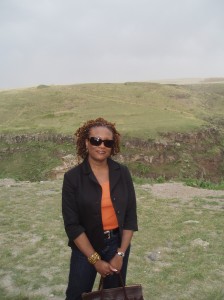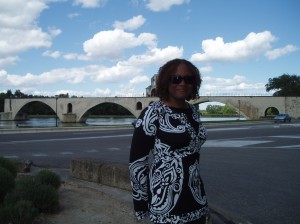
There’s nothing like reliving old memories—especially those that have shaped you into the person you are today. And last week, thanks to a fabulous Chicago-based Travel radio show, I got the chance to reminisce about my sistagirl-living-abroad-in-Italy experience from five years ago!
The hour-long show, which airs from 11 a.m.-noon U.S. Central time on Fridays, is called The Traveling Eye, and its programming is especially designed to appeal to upscale African-American consumers and travelers. It’s hosted by two dynamic sisters: my Delta Sigma Theta Sorority, Inc., soror and Chicago radio legend Bonnie DeShong and travel specialist and Advantage International President and Founder Ja’Vonne Harley. Listen to THEIR show and before it’s over, you’ll want to be online or on the phone booking some fabulous getaway. And some advertisers don’t believe that black folks travel—and travel in style? Along with WHUR-FM in Washington, D.C., Bonnie and Ja’Vonne are leading a tour of nearly 100 folks to Egypt and Dubai in February—and this nearly two-week trip is SOLD OUT!
During last week’s show, Bonnie and fill-in host Gene Harley asked me and a super-bad American expat sister named Tiffany Zunker who’s lived abroad for half her life to share thoughts on why we first got interested in living abroad. (In my case, listening to tales from my world-traveling aunt Sophenia and visiting my friend Javan on a U.S. Army base in Germany during grad school.) What I felt when I first stepped off the plane in Florence, Italy, as a new resident and not just a tourist. (Totally excited and ready for the adventure!) Whether I ever felt lonely. (Now that’s hard to do in Italy unless you turn yourself into a recluse, as family-oriented Italians will embrace you and often treat you like an extended member of the family!)
How I dealt with my hair (got my two-strand twists hooked up regularly in Florence by a sweet Nigerian stylist in the back of her brother’s barber shop) and (far more of it in Florence than in the States, that’s for sure!). As I joked, sisters often head to Italy believing the adage that “Italian men LOVE them some black women!” The reality is that Italian men adore women period—which is a way-welcoming thing to black women, who don’t always feel celebrated in American culture.
Want to hear the whole show? Click here! (Skip the lead-in newscast and start listening at about 3:15.)
Dishing about my fabulous adventure made me homesick for Italy, and longing for another live-abroad experience. You know me—have passport, will travel!
If you want to catch TODAY’s “Traveling Eye,” listen to it live on Fridays from 11 a.m.-noon U.S. Central time on the WVON/1690 AM The Talk of Chicago” website and click the flashing “Listen Live” icon.

